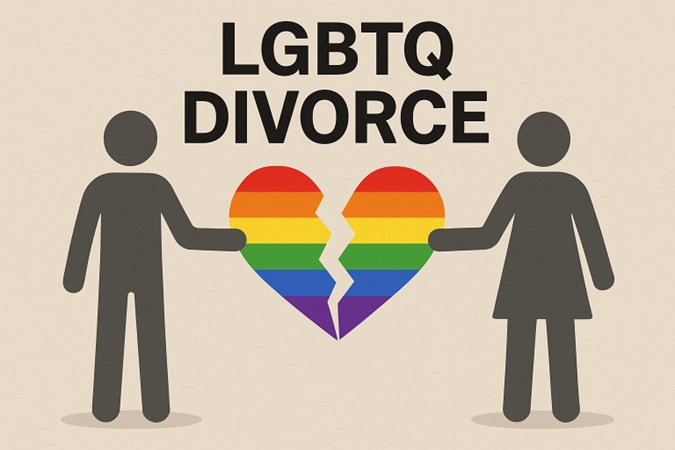Key Takeaways:
- LGBTQ couples face distinct legal and societal challenges during divorce proceedings.
- Issues such as asset division, parental rights, and societal discrimination can complicate the process.
- Awareness and proper legal guidance are essential for equitable outcomes.
Table of Contents
Introduction
Divorce is rarely straightforward, but for LGBTQ couples, the journey can present unique obstacles not typically encountered by their heterosexual counterparts. Laws have evolved rapidly over recent years, yet historic inequities and social attitudes continue to influence the divorce process. Navigating these complexities demands both awareness and strategic planning. Seeking clarity and legal support—such as discussing the terms of a settlement agreement Brick NJ—can be a crucial first step for many same-sex couples confronting divorce.
For many LGBTQ individuals, being recognized as married was a hard-won battle. These changes in recognition may profoundly impact the experience of divorce, from how courts view a relationship’s duration to the interpretation of shared assets and parental roles. As more LGBTQ families encounter the end of a marital partnership, understanding these distinct challenges is key to reaching fair and respectful resolutions.
On top of legal and logistical hurdles, LGBTQ couples may also encounter persistent stigma or a lack of accessible resources tailored to their needs. Those who initiate divorce proceedings sometimes discover not only gaps in the law but gaps in cultural understanding as well—making emotional and legal guidance by LGBTQ-savvy professionals all the more essential.
The process can also involve significant uncertainty regarding children, property, and personal safety. With the proper preparation and reliable legal counsel, however, couples can untangle these challenges and move forward with dignity and security.
Legal Recognition & Marital Duration
One of the most significant legal obstacles facing LGBTQ couples during divorce is determining the official start date of the marriage. Before the legalization of same-sex marriage, many couples had lived together, shared finances, and built lives well before their unions became legally recognized. When divorce proceedings begin, courts may only consider the legal marriage date when dividing assets and assigning spousal support. This approach can often disregard years—or even decades—of partnership, resulting in divisions that feel unjust or disconnected from the reality of the couple’s shared history.
For example, if a same-sex couple lived together for 15 years but were only legally married for the last 3, a judge may rule on asset division based solely on those 3 years. This limitation can have a profound effect on both financial stability and emotional closure. An in-depth feature from NBC News highlights how this issue continues to trouble LGBTQ divorces across the United States, particularly in states without well-defined case law on the matter.

Parental Rights & Custody Issues
Custody battles are another area where LGBTQ spouses may encounter unexpected roadblocks. In many families, only one parent is the biological or legally recognized parent, especially in cases involving adoption or assisted reproduction. Without legal protections like second-parent adoption or explicit parental designations, the non-biological parent might struggle to gain custody or even visitation rights after divorce. In some jurisdictions, courts may refuse to recognize the parental role that the non-biological or non-adoptive parent played in the child’s life, which can cause profound emotional harm to both the adult and the child.
For these reasons, experts advise LGBTQ couples to secure comprehensive legal documents establishing parental rights early in the relationship, long before divorce is on the table. Groups like Lambda Legal offer resources on how to protect both parents and ensure continued family connections regardless of marital status.
Asset Division Complications
The process of dividing property and assets in an LGBTQ divorce is rarely straightforward. Because couples often built lives together for years before their marriages were legally recognized, determining what qualifies as “marital” property—and what decisions should be based on individual contributions—can be highly contentious. State laws on property division vary widely, and not all states have established guidelines tailored to the nuances of same-sex relationships. This ambiguity can lead to extended court battles or settlements that overlook landmark milestones in the couple’s shared journey.
Many legal professionals recommend working with attorneys well-versed in LGBTQ family law. An experienced advocate can help clarify state-specific procedures and argue for the fairest possible distribution of property. According to NBC News reporting, some queer couples have had to rely on creative legal strategies or alternative dispute resolution to achieve just outcomes.
Discrimination & Bias
Despite significant advances in legal equality, implicit and explicit bias persist within the court system. LGBTQ individuals may face prejudice from judges, opposing counsel, or even professionals meant to facilitate the divorce process. This discrimination can manifest in unfavorable custody rulings, dismissive attitudes toward the family unit, or reluctance to recognize the unique circumstances of the relationship. These experiences highlight the importance of securing legal representation familiar with LGBTQ issues and committed to fair treatment in the courtroom.
Emotional & Social Support
Divorce inflicts significant emotional pain, and for LGBTQ couples, these struggles may be intensified by societal stigma or lack of supportive community networks. Isolation can exacerbate feelings of loss or grief, especially if friends, family, or religious communities are not affirming. Access to LGBTQ-affirming mental health services and supportive groups is vital. Connecting with experienced therapists or peer support organizations can guide healing and self-advocacy during and after the divorce process.
Legal Resources & Advocacy
Comprehensive legal knowledge is an indispensable asset during a divorce—whether facing contested custody, asset division, or discrimination. LGBTQ individuals are encouraged to seek out law firms and advocacy organizations that specialize in their unique needs, stay up-to-date on evolving state and federal laws, and lean on reputable sources for information. Proactive research and guidance can dramatically influence the outcome, helping to secure more equitable settlements and, ultimately, a brighter path forward.
Conclusion
While divorce brings inherent hardships, LGBTQ couples encounter additional, sometimes hidden, complexities rooted in the evolving legal and social environment. Individuals can better protect their rights, assets, and well-being by preparing for these hurdles—from legal ambiguities regarding marriage duration to challenges in parenting rights and emotional support. Diligent legal planning, targeted advocacy, and compassionate support remain the most potent tools for successfully navigating the end of a same-sex marriage.







No Comments